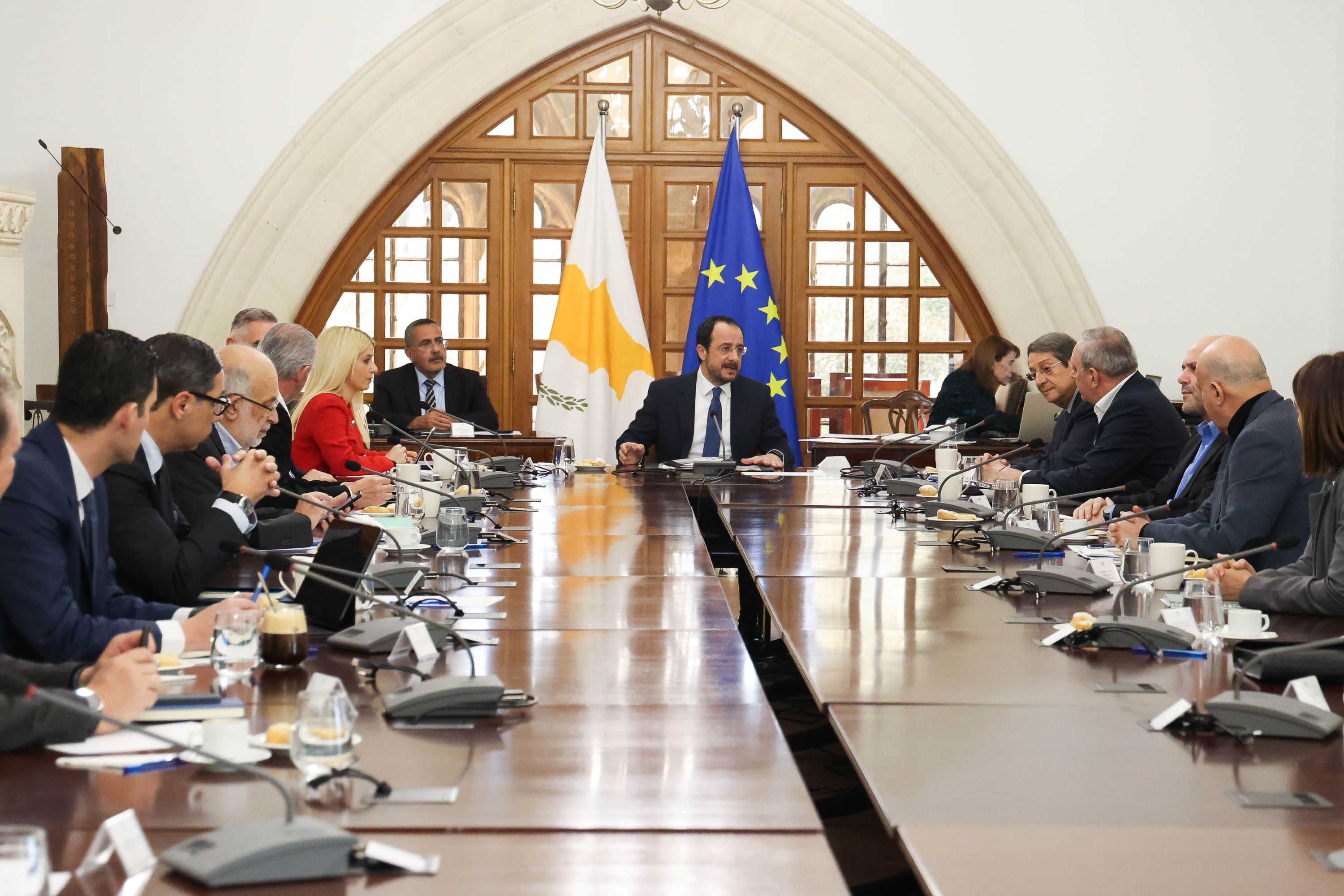Party leaders were briefed on Friday by President Nikos Christodoulides on the latest developments in the Cyprus problem, following recent meetings held by UN Under-Secretary-General for Political and Peacebuilding Affairs Rosemary DiCarlo in Cyprus, Greece, and Turkey. The briefing also came ahead of next month’s expanded meeting on the issue.
Christodoulides referred to his meeting with DiCarlo on Monday, as well as preparations for the enlarged meeting set to take place in Geneva on March 17-18. The meeting will bring together both sides of Cyprus, representatives of the island’s three guarantor powers – Greece, Turkey and the United Kingdom – as well as the UN.
The briefing, which began at 10am and concluded at 1.30pm, was attended by former President Nicos Anastasiades, Foreign Minister Constantinos Kombos, government spokesman Konstantinos Letymbiotis, undersecretary to the president Irene Piki, Greek Cypriot negotiator Menelaos Menelaou, and leaders of parliamentary parties inter alia.
Speaking after the meeting, Letymbiotis said the National Council was informed on developments since it last convened in October 2024.
The president reiterated that his priority remains a solution based on a bizonal, bicommunal federation within the UN framework, a position that Letymbiotis said the UN also supports.
“Securing the interests of the Republic of Cyprus and safeguarding our state sovereignty are non-negotiable constants,” he said.
Letymbiotis said the Greek Cypriot side was preparing for the meeting in Geneva, with an aim to resume negotiations.
“We are not at the point we would have liked to be at, of course, which is beyond doubt the resumption of negotiations,” he said.
He added that the government would continue to take initiatives in that direction.
Responding to questions, Letymbiotis said the government had not been informed about DiCarlo’s meeting in Turkey.
“What is said publicly may not always reflect what was actually discussed in a meeting,” he added, referring to information attributed to Turkish foreign ministry sources.
Letymbiotis also noted that there was no confirmed date for DiCarlo’s planned visit to London, which he said would take place at a later stage.
He also said the National Council was deliberating whether to travel with the president to Geneva.
“The intention is, of course, for them to attend, but this will be evaluated at a later stage,” he said.
Regarding the dates of the Geneva meeting, Letymbiotis said they were not definite, pending verification by the UN.
House President and Disy leader Annita Demetriou described the Cyprus problem as being at a critical turning point, leaving no room for inaction or political maneuvering.
“The real challenge is salvaging the prospect of a solution and resuming negotiations within the agreed framework,” she said. “Strategy, proper preparation, determination, and sincerity are necessary.”
She added that Disy assumes its share of national responsibility with its positions and proposals.
Akel General Secretary Stefanos Stefanou stressed that Turkey and the Turkish Cypriot leadership had moved toward a two-state solution.
“New ideas are being floated, and it is imperative that the Greek Cypriot side makes clear that its position is to resume talks from where they left off in 2017, within UN Secretary-General Guterres’ framework,” Stefanou said.
What is important, he added, was that when the Greek Cypriot side submits its thoughts and proposals, “the one that should be satisfied is the international community.”
Diko president Nikolas Papadopoulos acknowledged increased diplomatic activity after years of stagnation.
“Despite Turkey’s negative stance, we must support the efforts of the president of the Republic […] We must not abandon the effort,” he said.
Elam president Christos Christou said his party submitted views and proposals.
“We believe that the enlarged meeting will not lead to any developments and that the Republic of Cyprus should not attend,” he said.
Christou added that Elam had “clear and steadfast positions on the Cyprus problem” and that it was important not to limit discussions to the opening of crossing points.
Edek president Marinos Sizopoulos argued that the Cyprus issue is not just a bicommunal problem but an international problem of invasion.
“Since we cannot impose a democratic solution, we must handle the matter carefully to avoid reaching a bad solution,” he said.
Dipa president Marios Karoyian credited Christodoulides’ efforts in securing the Geneva meeting.
“There is clear movement from various players,” he said. “We must remain flexible.”
Green Party vice-president Kyriakos Tsimillis said the parties had received a detailed briefing on the situation.
“There is momentum, thanks to the government’s efforts. Whether they will bear fruit remains to be seen, but we are now reaching Geneva,” he said.
He added that some parties were attempting to find a middle ground between a bizonal, bicommunal federation and a two-state solution.
“We have seen the problems and differing opinions regarding crossing points,” he added.
The National Council meeting followed DiCarlo’s visit to Cyprus and her separate meetings on Monday with Christodoulides and Turkish Cypriot leader Ersin Tatar.
After her visit to Nicosia, DiCarlo traveled to Athens and Ankara, where she met with Greek Foreign Minister George Gerapetritis and Turkish Deputy Foreign Minister Mehmet Kemal Bozay.






Click here to change your cookie preferences